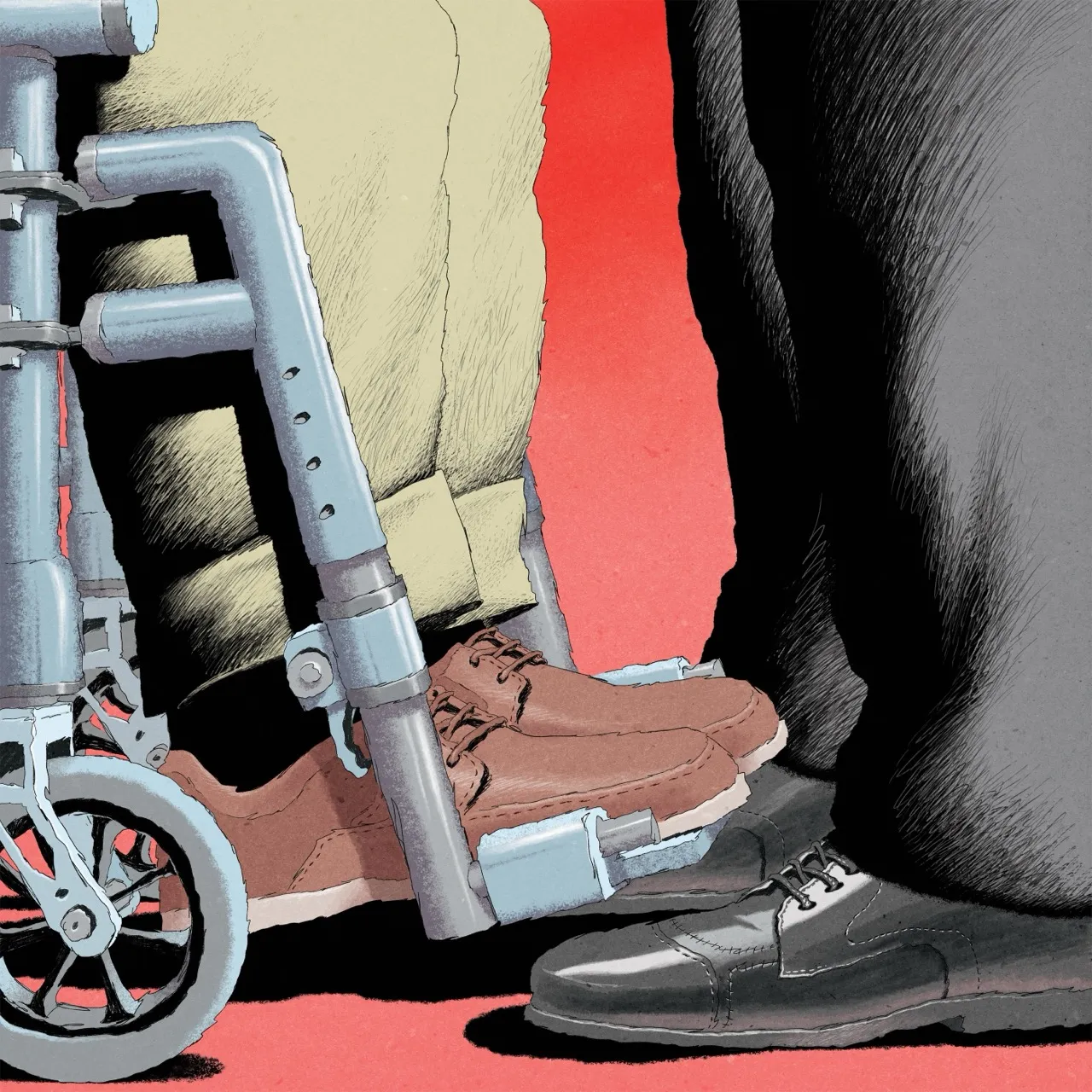Terry DeYoung: Making America inaccessible again
I fail to understand how people of faith, especially our elected officials, can support these attacks on the civil rights of people with disabilities, which erode community and any hope of self-directed lives.
EDITOR'S NOTE: The views and opinions expressed are those of the writer and not of Ottawa News Network. This article was originally published in the Reformed Journal on Oct. 8.
Throughout my 14 years as the Reformed Church in America’s coordinator for Disability Concerns, I sought to specifically include and name disability in any conversations connected to diversity, equity, and inclusion, because people with disabilities were usually overlooked in such discussions.
When I would gently challenge consultants leading diversity workshops for not naming disability, they were apologetic. They said that, of course, people in the disability community deserved to be included with other marginalized groups (people of color, women, LGBTQ+), but then those same consultants struggled in their efforts to add disability to their presentations. This ongoing failure to even name disability in DEI conversations has led many disability groups to revise DEI to DEIA (Disability, Equity, Inclusion, and Accessibility).
Even though it’s felt like few have been paying attention to these efforts, the Trump Administration was. On Jan. 20, following President Trump’s inauguration, an anti-DEI executive order, “Ending Radical and Wasteful Government DEI Programs and Preferencing,” was issued. It threatens to eliminate basic accessibility for people who live with disabilities and includes sections like this one:
The Director of the Office of Management and Budget, assisted by the Attorney General and the Director of the Office of Personnel Management, shall coordinate the termination of all discriminatory programs, including illegal DEI and “diversity, equity, inclusion, and accessibility” mandates, policies, programs, preferences, and activities in the Federal Government, under whatever name they appear. … Federal employment practices, including Federal employee performance reviews, shall reward individual initiative, skills, performance, and hard work and shall not under any circumstances consider DEI or DEIA factors, goals, policies, mandates, or requirements.
Among other actions in the first week of the Trump presidency, the “Accessibility” page and all American Sign Language content was removed from the White House website. ASL interpreters are no longer included at emergency press briefings. The Department of Justice Civil Rights Division was frozen “until further notice”; this office is responsible for fielding complaints and cases to protect against discrimination based on race, sex, gender, class, age, religion, disability, national origin, and more. It is also one of the main mechanisms for enforcing the Americans with Disabilities Act and Section 504 of the Rehabilitation Act.

No doubt you’ve heard of the ADA, but Section 504 of the Rehabilitation Act may not be as familiar. Early in the COVID-19 pandemic, the Netflix documentary "Crip Camp: A Disability Revolution" was released and energized many of us in the disability community with dramatic footage of the Section 504 protests in the 1970s and the challenges in the 1980s to get the ADA passed in 1990. The initial implementation of Section 504 was driven by significant advocacy, including the 26-day San Francisco sit-in by disabled advocates in 1977, which was the longest occupation of a federal building at the time.
Section 504 prohibits discrimination against qualified individuals with disabilities in any program or activity receiving federal financial assistance. It ensures that people with disabilities have equal access to educational opportunities and other services by requiring organizations to provide reasonable accommodations and modifications, such as physical accessibility, effective communication aids, and other services to ensure equal opportunity. It was one of the first U.S. federal civil rights laws offering protection for people with disabilities. Section 504 was updated in 2024 to clarify and strengthen protections against disability discrimination in federally funded health programs.
Each federal agency is responsible for enforcing its own regulations under Section 504. But on May 16, 2025, the U.S. Department of Energy used what’s known as a direct final rule to announce it was rescinding a rule that’s been on the books since the 1970s requiring any building receiving federal funds, whether for new construction or undergoing renovation, to be made accessible. DOE said the Section 504 rule, which was written by the then-Department of Health, Education and Welfare and incorporated by Congress into the Rehabilitation Act of 1973, is unnecessary because of other federal requirements, so it was fast-tracking the rule rescission.
Given the general prohibition on discriminatory activities and related penalties … DOE finds these additional provisions unnecessary and unduly burdensome,” the agency said in the preamble to the rule rescission. “It is DOE’s policy to give private entities flexibility to comply with the law in the manner they deem most efficient.
The agency intended to make the rescission effective July 15 but pushed the date back to September 12 after it received more than 20,000 comments, a significant number of which protested the action. Disability-rights advocates say the agency is misusing the fast-track process. The Disability Rights Education and Defense Fund and other disability rights organizations opposed the move, arguing that the rules are crucial for ensuring inclusion and access and that their elimination is a direct attack on civil rights.

The Center for Public Representation concluded that eliminating the protections of the rules “will undermine one of the primary purposes of Section 504 by encouraging new construction and alterations that are not accessible to people with disabilities. It will also create confusion, additional work and expense, and potential liability for recipient entities.” Because the Section 504 regulations reflect a careful compromise approved by Congress and have been in effect for almost 50 years, legally, they cannot be simply nullified by the DOE.
DREDF officials contend that if the Trump Administration is successful, this hasty approach may be used to modify more of the 80-plus sets of Section 504 regulations across the federal government. The DOE change could affect thousands of buildings that are part of state and local government, universities, and elsewhere that receive funding from the agency. Existing regulations require facilities constructed or altered after June 13, 1980, that receive federal financial assistance to be “readily accessible to and useable by handicapped persons.”

Trump’s second term has included numerous orders threatening or nullifying advances of the Disability Rights Movement that have taken decades to achieve. A September 16 article in The New Yorker (“Donald Trump’s Assault on Disability Rights”) details how federal offices and programs that ensure equal treatment are being shuttered and scaled back.
Besides The New Yorker article, here’s a sampling of other headlines I’ve been tracking just since August:
- Trump Administration to Reconsider Disability Regulations for Airlines
- Trump Plan Would Limit Disability Benefits for Older Americans
- Autism Advocates Blast Trump Administration Announcement as ‘Dehumanizing’
- Education Department Halts Funds to Programs for Deafblind Students Over DEI Concerns
- Parents Fear Losing Disability Protections as Trump Slashes Civil Rights Office
- CDC Temporarily Revokes Remote Work Approvals for Employees with Disabilities
- Trump’s Promise to End Vote-by-Mail Is Yet Another Attack on Disabled Voters
- Ed Department Preparing to Cut Millions in Special Education Funding, Advocates Warn
As these erosions to disability rights trickle down, many states with large MAGA bases are following suit in budget allocations. In "Being Heumann: An Unrepentant Memoir of a Disability Rights Activist," the late Judy Heumann writes, “When laws and policies get less visible, it becomes more and more difficult to know whether an action is even considered a violation of your civil rights.”
Standing up to the Trump Administration’s attacks is daunting. As The New Yorker article spells out, the President’s disdain for people with disabilities is well-documented. Amid my despair, I found a glimmer of support and encouragement in a line from my church’s World Communion thanksgiving liturgy last Sunday:
Bless the Lord, for we have been strengthened to stand with the oppressed.
Thanks be to God, the God of justice.
Would most Christians in the United States today agree that we worship a God of justice, one who calls on us to stand with the oppressed?
I fail to understand how people of faith, especially our elected officials, can support these attacks on the civil rights of people with disabilities, which erode community and any hope of self-directed lives. Certainly, there is no Christian faith perspective to support the Trump Administration’s policies that I’ve mentioned. If an argument about cost or efficiency is made, then, for consistency’s sake, let’s be honest and say that people with disabilities represent wasteful spending and are not worth inclusion.
— Terry DeYoung is a resident of Holland.
How to submit an opinion
Ottawa News Network accepts columns and letters to the editor from everyone. Letters should be about 300 words and columns should not exceed 1,000 words. ONN reserves the right to fact-check submissions as well as edit for length, clarity and grammar. Please send submissions to newsroom@ottawanewsnetwork.org.





